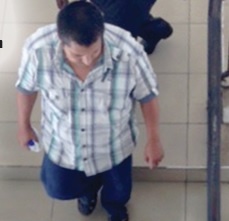The 42-year-old German standing trial at an Accra Fast Track High Court Financial Division for allegedly attempting to launder $650,000 to Bolivia purportedly told a narcotics control officer that he did not declare the amount he was carrying because he was afraid it might be seized.
This was made known by Ishmael Malvin Amon Kotei, the narcotics control officer stationed at Kotoka International Airport (KIA) at the time Piera Cascantees Victor Hugo arrived there to go through boarding formalities.
The witness told the court presided over by Justice Afia Serwah Asare-Botwe that even though the accused person told him the contents of one of his bags contained personal effects he became suspicious after he realized that the bag was heavy even after he had taken out the suspect’s personal effects.
He said this in his evidence-in-chief led by the Principal State Attorney, Mathew Amponsah and noted that he was stationed at KIA on April 29, 2013 and was assigned to Gate Five of KIA when the accused person, in the company of a certain lady, arrived to board a flight to Johannesburg, South Africa.
The narcotics control officer who explained the boarding formalities a passenger went through before boarding international flights said the accused person arrived around 8:40 pm while he was checking persons going through boarding formalities to ensure they were not illegally carrying narcotics or money.
According to him, he realized that the suspect had spent less than a week in Ghana and when he asked why he was leaving so soon the suspect said the economic condition in the country was not conducive for business.
Furthermore, the witness stated that he became suspicious about the response and asked Victor’s permission to cut one of his bags open, to which he reluctantly agreed. He added that when he opened the bag he realized that apart from his personal belongings, there was money concealed in a compartment of the bag with a cardboard lining wrapped in $100 notes.
In addition, the officer said he took the remaining four bags to their scan office after asking him how much he had in total to which the suspect said he had $650,000.
He said they entered the Narcotics Control office and two of their colleagues took over in checking the remaining bags because he was not allowed to cut and count money. He explained that while the remaining bags were being cut open his colleague, Obeng, who was also on duty, was taking pictures of everything that went on and tendered some pictures in evidence to the court for identification.
The witness also observed that a search conducted on the suspect yielded money in Zambian Dollars, South African Rand, Argentinean Pesso, Paraguayan Guarani, Bolivian Boliviano as well as Brazilain Real and Euro.
Explaining further, the narcotics officer stated that after the money was counted and confirmed to be $650,000 with the Deputy Narcotics Control Officers, Mr. Yeboah supervising them, Hugo was put behind bars together with the lady who was him.
Under cross-examination by Alexander Afenyo Markin, Member of Parliament for Effutu Constituency and counsel for the accused person, the witness stated that he did not need to talk to any customs officer to ascertain whether or not the accused person had, indeed, declared the amount he had with him.
He also said he did not find the need to see any immigration officer before arresting the suspect but admitted that it was the biggest amount ever taken from an individual.
The narcotics officer disagreed with a suggestion by counsel for the suspect that just because someone concealed money did not mean that person was a money launderer but said if a passenger had documents backing any money they were carrying there would be no need for them to conceal it.
The witness also said the suspect, after his arrest, should have produced documents if indeed he had any documents in his possession which gave him the right to carry the $650,000.
When asked what language signposts and immigration forms were usually written in, the officer said there were in Standard English as Ghana was an English speaking country.
Counsel for the suspect consequently put it to him that a passenger who was not educated in English and could not write the language would have problems reading whatever was written in English at KIA, to which the witness said anybody who spoke Standard English would understand any writing in English at KIA.
Counsel for Victor Hugo also applied for bail for his client on health grounds, but the trial judge said he should bring a formal application.
The case has been adjourned to today.
Victor pleaded not guilty to four counts of attempted exportation of currency without a licence issued by the Bank of Ghana, concealment of currency, smuggling of currency and money laundering after the court hired the services of a Spanish interpreter who read out the charges and explained the evidence to him as proceedings were ongoing.
Crime & Punishment of Thursday, 14 November 2013
Source: Daily Guide
German did not declare amount - Witness

















